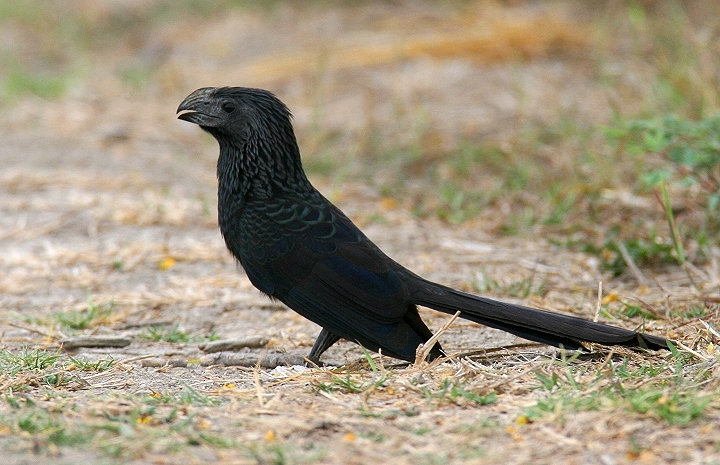Map Snapshot


2 Records
Status
Maryland has one accepted Groove-billed Ani report (#1996-017), a roadkill female found at Millington, Kent Co., Maryland (11/3/1975) (USNM 573535). Per Iliff: "Although Groove-billed Ani is considered monotypic by some authors (e.g., Clements 2000), Pyle (1997) considers East Mexican sulcirostris (which breeds north to s. TX) as distinct from West Mexican pallidula. Maryland's specimen is identified in the USNM database as belonging to this more expected subspecies, which has precedence for vagrancy to MN and VA (Pyle 1997)."
Seasonality Snapshot
Source: Wikipedia
| Groove-billed ani | |
|---|---|

| |
| In Belize | |
| Scientific classification | |
| Domain: | Eukaryota |
| Kingdom: | Animalia |
| Phylum: | Chordata |
| Class: | Aves |
| Order: | Cuculiformes |
| Family: | Cuculidae |
| Genus: | Crotophaga |
| Species: | C. sulcirostris
|
| Binomial name | |
| Crotophaga sulcirostris Swainson, 1827
| |

| |
| Range of C. sulcirostris | |
The groove-billed ani (Crotophaga sulcirostris) is a tropical bird in the cuckoo family with a long tail and a large, curved beak. It is a resident species throughout most of its range, from southern Texas, central Mexico and The Bahamas, through Central America, to northern Colombia and Venezuela, and coastal Ecuador and Peru. It only retreats from the northern limits of its range in Texas and northern Mexico during winter.
Taxonomy
[edit]The groove-billed ani was formally described by the English naturalist William Swainson from a specimen collected in Temascaltepec, Mexico. It still bears its original binomial name of Crotophaga sulcirostris.[2][3] The specific epithet combines the Latin sulcus meaning "furrow" with -rostris meaning "-billed".[4] The species is monotypic: no subspecies are recognised.[3]
Description
[edit]The groove-billed ani is about 34 cm (13 in) long, and weighs 70–90 g (2.5–3.2 oz). Wingspan ranges 41–46 cm (16–18 in). It is completely black, with a very long tail almost as long as its body. It has a huge bill with lengthwise grooves running the length of the upper mandible. It is very similar to the smooth-billed ani, some specimens of which have bills as small as the groove-billed and with grooves on the basal half. The two species are best distinguished by voice and range. In flight, the ani alternates between quick, choppy flaps and short glides.
Habitat and diet
[edit]Like other anis, the groove-billed is found in open and partly open country, such as pastures, savanna, and orchards. It feeds largely on a mixed diet of insects, seeds, and fruits.
Breeding
[edit]The groove-billed ani lives in small groups of one to five breeding pairs. They defend a single territory and lay their eggs in one communal nest. All group members incubate the eggs and care for the young.

Protected status
[edit]The groove-billed ani is protected under the Migratory Bird Treaty Act of 1918.[5]
References
[edit]- ^ BirdLife International (2016). "Crotophaga sulcirostris". IUCN Red List of Threatened Species. 2016: e.T22684438A93029765. doi:10.2305/IUCN.UK.2016-3.RLTS.T22684438A93029765.en. Retrieved 13 November 2021.
- ^ Swainson, William (1827). "A synopsis of the birds discovered in Mexico by W. Bullock, F.L.S. and Mr. William Bullock jun". Philosophical Magazine. New Series. 1: 364–369, 433–442 [440]. doi:10.1080/14786442708674330.
- ^ a b Gill, Frank; Donsker, David; Rasmussen, Pamela, eds. (January 2021). "Turacos, bustards, cuckoos, mesites, sandgrouse". IOC World Bird List Version 11.1. International Ornithologists' Union. Retrieved 24 June 2021.
- ^ Jobling, James A. (2010). The Helm Dictionary of Scientific Bird Names. London: Christopher Helm. p. 373. ISBN 978-1-4081-2501-4.
- ^ MBTA Alpha List Archived 2007-10-10 at the Wayback Machine
- Cisneros-Heredia, Diego F. "Información Sobre la Distribución de Algunas Especies de Aves de Ecuador" (PDF). Boletín SAO (in Spanish). XVI (1): 7.
External links
[edit]- Explore Species: Groove-billed Ani at eBird (Cornell Lab of Ornithology)
- Groove-billed Ani photo gallery at VIREO (Drexel University)
- Groove-billed Ani Images by Monte M. Taylor
- Groove-billed Ani Picture at www.avesphoto.com

